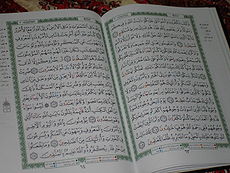- Mus'haf
-
Part of a series on the Quran 
Mus'haf Sura · Ayah Central figures Adam · Noah · Abraham · Joseph · Moses
King David · King Solomon · Mary
Jesus Christ · MuhammadQuran reading Tajwid · Hizb · Tarteel · Quranic guardian
Manzil · Qari' · Juz' · Rasm · Ruku' · SujudTranslations List of translations · English translations History Meccan suras · Medinan suras Tafsir Persons related to verses · Justice
Asbab al-nuzul · Naskh · Biblical narratives
Tahrif · Bakkah · Muqatta'at
Esoteric interpretationQuran and Sunnah Literalism · Miracles · Science
Female figuresPerspectives Shia · Criticism · Desecration
Surah of Wilaya and Nurayn · Tanazzulat
Qisas Al-Anbiya · House of the QuranA mus'haf (Arabic: مصحف, Arabic pronunciation: [ˈmʊsˤħaf] with the ṣ and ḥ as two separate consonants, not *mʊʃaf) is a codex or collection of sheets (sahifah, see below). The Qur’an, which Muslims believe to have been revealed at various times and in various ways during the 23-year period at the end of Muhammad's life, was collected into a codex under the third Caliph, Uthman ibn Affan.[1].
The Islamic term al-Qur’ān means 'the Recitation', denoting its content. When referring to the physical bound volume, some use the term mushaf.
The Qur'an refers to itself as kitab, not as mus'haf. Noting this, some scholars have argued that in the Qur'an does not present itself as a "book", which implies it is finished and complete, so much as a "scripture", something written or communicated, which gives it more dynamism and life. The Qur'an speaks of itself as having been a kitab even before it was put into writing. [2]
This use has led to a misconception: Some believe the Mushaf of Fatimah to mean the "Qur'an of Fatimah", thus accusing the Shia of believing in a special Qur'an.
Al-Islam.org writes:
“ Mus'haf" refers to a collection of "Sahifa" which is singular for "page". The literal meaning of mus'haf is "The manuscript bound between two boards". In those days they used to write on leather and other materials. They either rolled the writings -- what is known as scroll in English. Or they kept the separable sheets and bound them together, in what could be called as "mus'haf", a book in today's terms. The equivalent to the word book "kitab" used to (and still is) refer to either a letter (e.g. of correspondence) or to a document that was written down or recorded. The Arabic word for wrote "kataba" is a derivative of the same word.
Although the Quran is commonly called a "mus'haf" today, perhaps referring to its "collection" after it was dispersed. Quran is a mus'haf (book), but any mus'haf (book) is not necessarily the Quran[3]
” See also
- Al-Jafr (book)
- Al-Jamia
- Al-Sahifa al-Sajjadiyya
- Book of Fatimah
- Digital Qur'an
References
- ^ Wheller, Brannon M. Prophets in the Quran: An Introduction to the Quran and Muslim Exegesis, Continuum Books, 2002, p. 5.
- ^ Madigan, Daniel. The Qur'an's Self-Image: Writing and Authority in Islam's Scripture, Princeton University Press, 2001.
- ^ The Book of Fatimah (AS)
External links
Categories:- Arabic words and phrases
- Quran
Wikimedia Foundation. 2010.

